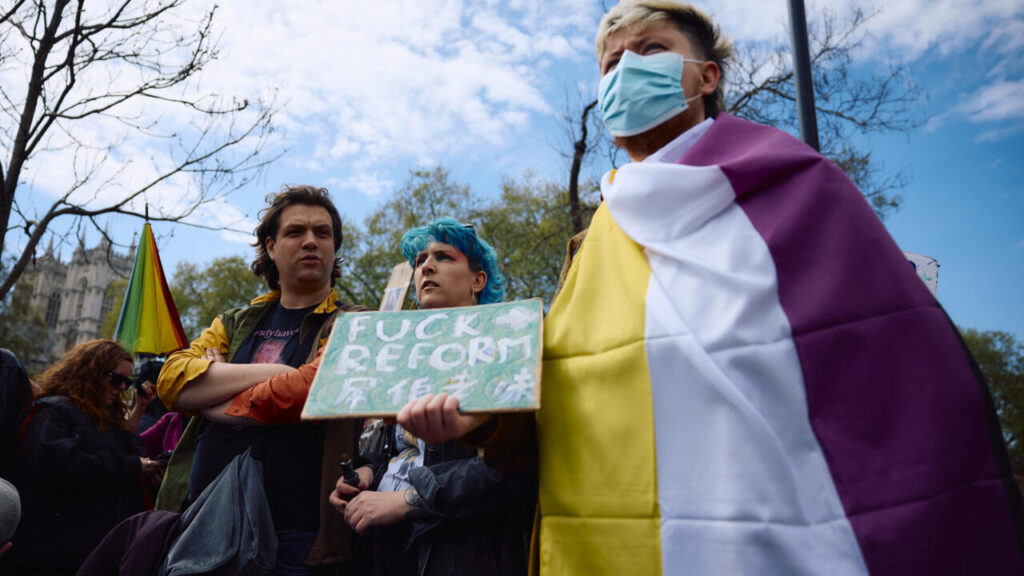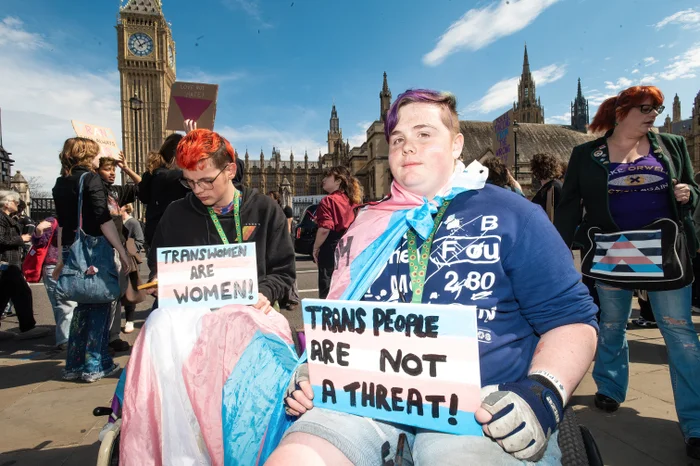Equality and Human Rights Commission guidance to be submitted to ministers this month will tell schools, hospitals, leisure centres and cinemas to limit trans access
Schools, hospitals, leisure centres and cinemas will be told to ban trans women from using single-sex spaces including lavatories and changing rooms under equalities guidance to be submitted to ministers this month.
The Equality and Human Rights Commission (EHRC) is understood to have rejected demands from campaigners to water down rules that would restrict the ability of trans people to access services of their chosen gender.
The statutory guidance will spell out that transgender competitors can be excluded from single-sex sporting competitions and that it would be reasonable for a woman to object to the presence of a transgender woman if she will be getting undressed or in a vulnerable situation.
The guidance applies to any organisation that provides services to the public.

Shops and gyms will be included in its scope but the guidance also extends to government departments, the NHS and prisons. It covers private organisations or charities if they are providing a public service, for example a private care home providing care on behalf of a council.
The EHRC will submit its updated guidance to Bridget Phillipson, the women and equalities minister, before the end of the month. It is believed Phillipson will approve the guidance as long as it is in line with the law. It will then be laid before parliament.
The guidance will not radically differ from a draft published when the EHRC launched its consultation on changes after a Supreme Court ruling in April, which said “women” and “sex” must be defined in terms of biological sex for the purposes of the Equality Act.
Many organisations, including some NHS trusts and the civil service, have said they are waiting for the guidance before implementing changes.
A source with knowledge of the consultation told The Times: “The law is the law, and the law’s not going to change.”
Transgender campaigners have claimed the changes will breach their human rights and promised to bring legal challenges. Some have questioned whether all 50,000 consultation responses could have been adequately analysed in such a short time frame.
The Times understands that the guidance is still being finalised and it will not decree that services have to provide single-sex spaces, but that if they do — for example if a lavatory is intended for women — transgender women would be excluded from using it. To allow someone of the opposite sex to use the facilities would be very likely to amount to unlawful discrimination.
It will also make clear that it will not be deemed as discrimination to exclude trans people from those facilities and that services will be allowed to request birth certificates to ensure single-sex services are protected.
The draft guidance also said that in certain circumstances a trans person could be excluded from a service even if it matched their biological sex.
It read: “A legitimate aim for excluding a trans person from a separate or single-sex service for their own biological sex might be to prevent alarm or distress for other service users.
“A trans man might be excluded from the women-only service if the service provider decides that, because he presents as a man, other service users could reasonably object to his presence, and it is a proportionate means of achieving a legitimate aim to exclude him”.
The final text has not yet been agreed and may not be exactly the same as that presented in the draft, but sources indicated it would have the same effect.

The guidance will also say services will need to consider whether there is a suitable alternative for trans people to use. It will say that in the case of areas that are necessary for everyone, such as lavatories, it would not be proportionate to leave a trans person with no facilities.
Staff will be able to make inquiries about a person’s birth sex or legal changes made to their gender — but said this could be classed as discrimination if it was not done in a sensitive way.
The source said: “The EHRC does know what the law is and can’t publish final guidance that is in complete contravention of the Supreme Court verdict, however much some might like them to.”
Campaigners have accused the EHRC of “ignoring” their views because it used artificial intelligence to categorise the replies to the consultation. Insiders said this was a practice that had been rolled out across government departments to save civil servants’ time.
A source at a national LGBT organisation familiar with the guidance said: “The EHRC received 50,000 responses to its consultation, and to consider them all in the past 27 working days would have required reviewing over 1,850 submissions a day.
“This is an extraordinarily short time frame, especially given the number of complex legal questions raised by businesses, organisations and the public. The speed with which the EHRC must have addressed each of the serious concerns, which included questions of compatibility with existing legislation, will be somewhat surprising to those that have spent many hours engaging with this process.”
The EHRC said it was “working at pace” to finalise the guidance and that services were “obliged to comply with the law as set out by the Supreme Court”.
A spokesman said: “The code of practice has not yet been finalised. We received an extremely high volume of responses to the consultation and are grateful to everyone who shared their feedback.
“To ensure we give these responses the consideration they merit, we are working at pace to analyse them and are amending the draft code of practice text where necessary to make it as clear and helpful as possible.
“But our code will remain consistent with the law as set out by the Supreme Court.”
The spokesman added that “supervised use of AI” was in place “alongside our expert legal assessment to ensure a balance of robustness, accuracy and speed, including promoting consistency and helping to avoid bias in managing this scale of responses”.
Source: The Times
Feature photo source: Bloomberg
Also read: Plastic credits: false solution to global plastic waste?
For more videos and updates, check out our YouTube channel.


